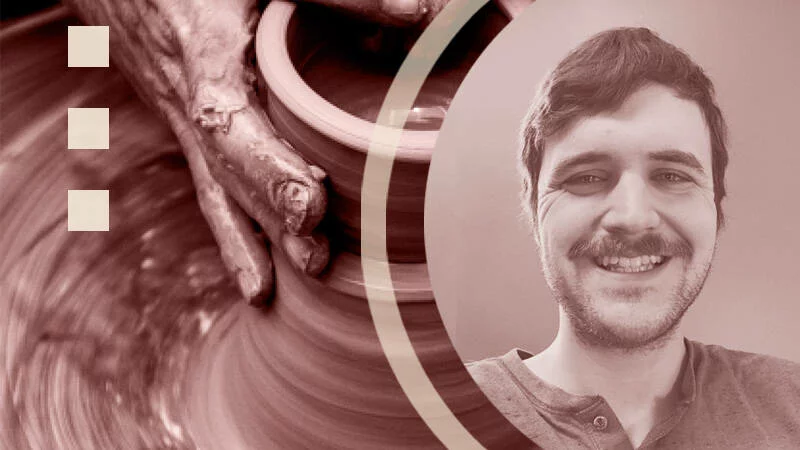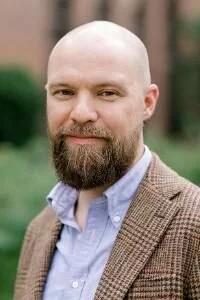The Henry Center is pleased to announce Benjamin Parks as the winner of the 2017–18 Brown Award for Student Scholarship.
The Brown Award is one of the six initiatives of the Creation Project, and was created to encourage graduate-level research at the intersection of science and the doctrine of creation.
Parks’ essay, “From the Waters of Babylon: Frankenstein, Transhumanism, and Cosmogony,” traces the recurring motif of the desire for mastery over nature found in Shelley’s Frankenstein, the transhumanist movement, and the creation accounts of the ancient Near East. In sharp contrast to the world picture of mastery, conflict, and power that these stories and movements depict, Parks argues that the creation account in Genesis presents us with an ontology ordered to God and characterized by love and peace. The essay concludes by drawing out some of the implications of his argument for how Christians should think about technology. His essay will be published in 2019 in the Trinity Journal.
Sapientia followed up with Benjamin to learn more about his interests and plans for future research.
JTC: Thanks for taking the time to chat with us. Can you tell us a little about yourself?
BP: I am a doctoral student in the joint program for theology and health care ethics at Saint Louis University, and I am twice graduate of TIU/TEDS (MA Bioethics, 2015 and MDiv, 2016). My wife and I just had our first child, and I don’t think our cat was ready for that change.
JTC: What first drew you to your field(s) of study?
I was first drawn to theology as an academic discipline because I naively thought studying theology would in and of itself make me a better person and draw me closer to God. That wound up being the case, but only because I had wonderful professors at Wheaton College (IL), TEDS, and SLU who have emphasized to my classmates and I the importance of worship and knowledge of the heart not just the mind.
As for health care ethics/bioethics, I more or less stumbled into that field. I have never been a good theologian or philosopher in that I am not very capable of making sense of grand abstract ideas. I I see transhumanism as offering a rival soteriology that promises everything Christian soteriology does: bodily perfection, immortality, and a world without sin or moral evil.am a bit of an academic philistine: I need down to earth examples that allow me to see the implications of a metaphysical or epistemological theory. Only when I have something tangible can I begin to think through the abstract. This is all to say that ethics—which is at times disparagingly referred to as “practical” theology or philosophy—was the one thing my undergraduate mind could wrap itself around. Also, as I said before, I came to theology seeking how to be a better person, so I was already biased towards questions of morality, towards always asking at the end of some long winded lecture, “How then should we (I) live?”
In addition to theology, I also majored in philosophy at Wheaton. My last course there was a philosophy senior seminar, “Ethical Theory.” I enjoyed it very much, and it made me consider enrolling in master’s program for philosophy. However, I had already been accepted into the MDiv at TEDS, and I still wanted to do that. One day, I stumbled across the page on Trinity’s website for the MA Bioethics and then saw that there was a joint degree option. If it wasn’t for that instance of providence, I wouldn’t be where I am at today.
JTC: What’s the focus of your dissertation research?
BP: I am still a year out from writing my prospectus, but as of right now I am considering transhumanism and Christian understandings of perfection, specifically Augustine’s conception of theosis. I see transhumanism as offering a rival soteriology that promises everything Christian soteriology does: bodily perfection, immortality, and a world without sin or moral evil. However, there are somethings about the transhumanist project that just don’t set well with me and I think are incompatible with broadly orthodox Christian theology. One such thing is transhumanism’s ontology, which I discuss in the paper. Another is how they understand bodily perfection (some think it means not having a body).
JTC: In a nutshell, what’s the argument of your essay?
BP: That technological transhumanism is incompatible with Christianity because it is rooted in a pagan understanding of creation that is antithetical to the Christian account.
JTC: Your essay argues that the transhumanist movement shares a common ontology and cosmogony with the creation myths of the ancient Near East. What do you think it is about this view of the world that gives it such staying power?
BP: I think it is the promise of mastery and control. The promise that we can “Be like God.” To put it in Augustinian terms, it is the desire of the City of Man to establish itself here & now on earth forever, and as I say in the paper it is in part driven by a disordered & perverse love for the created over the Creator.To put it in Augustinian terms, it is the desire of the City of Man to establish itself here and now on earth forever, and as I say in the paper it is in part driven by a disordered and perverse love for the created over the Creator.
The desire for mastery and control that drives much of technological innovation is clearly seen today thanks to Heidegger and other critics of technology. It is not so obvious when we look back at the ancient Near East, especially if one subscribes to a kind of Weberian disenchantment thesis that holds that ancient peoples were in harmony with the world and did not seek to dominate it. Moreover, in those creation myths it is the gods, not humans, who subjugate chaos and create the world, so it would seem that the domination of the world is a divine prerogative. However, the ancients had ways to manipulate their gods. Instead of dominating the world directly via the modern techno-scientific apparatus, the ancients sought to dominate the world indirectly via their magical rites and sacrifices. I think the next paper I write will have to further explicate that.
Either way, whether it is through magic or modern science, we have desire to bend the world to our will in an attempt to glorify ourselves.
JTC: Your essay is intensely interdisciplinary, moving from English literature, to ancient Near Eastern mythology, to Nietzsche, to transhumanism, to theology. What advice would you give to other graduate students wanting to do this sort of interdisciplinary work well?
BP: First, find a faculty mentor or a program that supports interdisciplinary work. I have been blessed to have studied now at three different institutions that value interdisciplinary work, and in our health care ethics program at SLU we have to take a doctoral seminar on how to do interdisciplinary research. Second, have interests outside of your area of research and let those interests speak to you. For example, like many theologians I enjoy science fiction, and I came to realize that I enjoyed science fiction because it is deeply theological even when an author is trying to be a-theological, which in turn led me to start exploring the theological themes in works of science fiction. Third, I would tell other students to not get bogged down by feelings of inadequacy. Write what you want to write, get feedback, and write again. It takes practice.
JTC: What do you hope your essay will contribute to the current scholarly and ecclesial conversations?
BP: Scholarly speaking, I hope that it helps further the examination of the religious roots of so-called secular projects. Much work has already been done on how secular, in terms of non-religious, is a myth, but it is a stubborn myth that is going to need many more blows before it crumbles.
Ecclesially speaking, I hope that this convinces at least one sibling in Christ that we should be more critical in our reception technology and modern science. Not that we should disengage and not use them, but that we have to be careful in our approach. Not the most original hope, but technophilia is pervasive in our culture, our pulpits, and our pews, so if this paper makes at least one person question that I would be happy.
JTC: Thanks Ben! All the best on your continued studies.
The Harold O. J. Brown Award is a paper competition for doctoral students engaged in interdisciplinary work in theological studies. The Brown Award is selected through a double-blind peer review process by an interdisciplinary panel of scholars and is conferred on the basis of the essay’s display of literary craftsmanship, intellectual humility, competence in the handling of evidence, and the significance of its contribution to the current scholarly and ecclesial conversations.







Comments
Be the first one to make a comment!